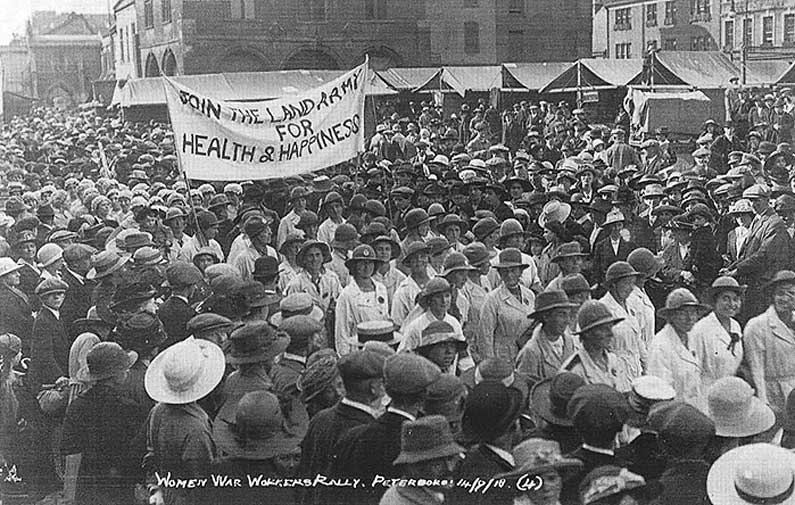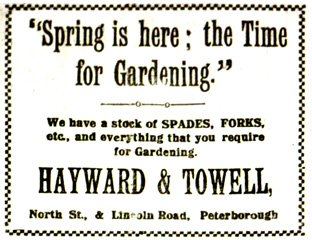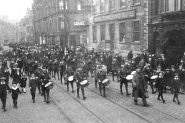1918 was the final year of World War One. Germany had been in retreat since the middle of 1917 but it wasn’t until the Armistice of 11 November 1918 that fighting ended. Also known as the Armistice of Compiègne from the place where it was signed, it came into force at 11 am and marked a victory for the Allies and a defeat for Germany but it wasn’t a surrender, that had to wait for the Treaty of Versailles. The Treaty was signed in June 1919 and was the most important of the peace treaties that brought World War I to an end. The Treaty ended the state of war between Germany and the Allied Powers.
Rationing
Although the First World War started in 1914 it wasn’t until 1916 that food supplies and increasing food prices started to become a real issue. The year was a poor harvest and there was an increase in merchant ships being sunk by German U-boats (submarines). Basic foodstuffs like potatoes, for instance, had tripled in price. The government began to recognise that it was the poor that were being affected disproportionately. By the end of 1917, the U-boat threat had nearly brought the country to its knees and the start of 1918 introduced compulsory rationing on sugar, meat, flour, butter, margarine and milk.
In 1918 Eye was a predominantly a rural farming village, with the brickyards and railway station to the north. At harvest crops would have been transported by train or wagon to the towns and cities. Farming played a crucial role during the First World War; keeping the population fed, both military and civilian, and was a key factor in maintaining not just physical strength but also morale and commitment to the war effort. In 1914, Britain imported over 60 per cent of its total food, today we still import around 50 per cent and the average crop yields for wheat in 1914 for were around 2.2 tonnes per hectare, today its around 8.5. There a very good document by the National Farmers Union here which tells the story further: World War One: The few that fed the many.
Women in the village would also have been called up to work full time on the farms. Over 23,000 women across Britain were recruited to work full-time on the land, to help replace the men who had left to fight in the war.

1918
January 1918 started with a mixture of sun and rain with below average temperatures but warmed up towards the end of the month. The population of the village was around 1,500.
On the 12 January 1918, the Peterborough and Hunts Standard reported on a concert that was held in the ‘Iron Room’ to raise money to buy gifts for soldiers from the village who were fighting in the war. The evening of Thursday 3 January 1918 started off with a piano solo – ‘Scenes from an Imaginary Ballet‘ and continued with a recital of ‘Vitai Lampeed‘ and the comic song ‘They built Picadilly for me‘. The event was that popular that the doors to the hall had to be closed to prevent any further people entering. Friday’s event was just as popular. In excess of £20 was raised, equivalent to around £900 today. Agricultural labourers were earning £3 – £4 a week in 1918.
In April 1918 the village was mourning the death of the former station master Mr James Thompson who upward of 40 years had been the station master in Eye. He had retired in nine years previously and was 74 when he died. As Station Master, he would have been a prominent figure in the and would have significant social standing. As well as running the station he was a keen cricketer had won many awards for his skill in growing roses.

In June a rummage sale in aid of the prisoners of war fund was held in the Iron Room (Leeds Hall). Arranged by the Eye Patriotic society everything from Hats, boots and clothing to potatoes were available to purchase. The sale raised £33 7s. 4d. for the 10 Eye soldiers who were prisoners of war.
“The association is endeavouring to raise sufficient to send weekly parcels of food to the Eye boys who are prisons of war. The parcels are sent through the County Regimental Associations and cost 8s. each. There are now 10 prisoners to support. In addition to the above effort, there is a regular collection from weekly subscribers amounting to £6 and £7 per month, and over £8 was collected on May Day by the children.”
In July a Whist Drive, which was held in the grounds of W. G. Moore in aid of the Red Cross. Thirty-four tables were occupied. A Whist drive is a social gathering where Whist (a card games) is played; the winners of each hand move to different tables to play the losers of the previous hand.
At a meeting of General Committee of the Eye, Newborough and Borough Fen joint Red Cross effort on Tuesday 23 July 1918 it was announced that that recent events including competitions, raffles, concerts and house-to-house collections had raised £500. A silver inkstand was presented to Miss. M. Williams in recognition for her services in training the children for the concerts and her many various activities that helped raise the money.
In August a concert was held at the Scout’s camp in the village in aid of the prisoner of war fund which was supported by the scouts themselves. Music was also provided by the scout’s instrumentalists.

In September it was reported that the oldest resident in the village was Mrs Mary Hales who had reached the age of 88. She still lived in the house she was born in and was the mother of 10 children. She also had 50 grandchildren and 26 grandchildren. It also went on to say she still did her own housework and could easily walk six or seven miles without feeling tired.
By October the Standard was reporting on the unconditional surrender of Bulgaria and the Liberation of Palestine. In the Blue Boar, the auction of four nearly new cottages known as the Gordon Cottages were taking place. They sold for £630.
At 11 a.m Paris time on 11 November 1918, the armistice came into effect. The Standard reported that news of the Armistice arrived in Peterborough between 10 and 11 o’clock (the Armistice itself was agreed six hours earlier at 5 am with the first term of it being that fighting would end at 11 am). The streets filled with people with flags and bunting everywhere and the day became a public holiday. Vehicles underwent a decorative transformation, school children were let out of school, and all business apart from flag selling came to a standstill.
The souvenir book of Eye recorded what happened when news of the armistice reached the village:
“The news reached Eye about 11 o’clock and the church bells were rung continuously from that time till about 4 pm. Flags and bunting appeared as if by magic, and there was great excitement everywhere. ”
At a meeting of the Eye Patriotic Association held in the Iron room, December 5, 1918, it was resolved that a Souvenir Book would be compiled to take account of the work of the Patriotic Society. The following year the parish war memorial was constructed and in November 1919 it was dedicated at a special service. It was designed and created by Mr Charles Gray of Walton.
Seven of eye’s soldiers lost their lives in 1918
- Arthur Percy Twelvetree Died 22 March 1918,
- Arthur Edward Langley Died 31 May 1918
- Ernest Rawding Died 5 June 1918
- Sidney Cousins Died 9 July 1918
- Benjamin George Tomlinson Died 22 August 1918
- Joseph Coles Died 23 October 1918
- George Thomas Wright Died 20 November 1918
Notes
- Following the signing of the Treaty of Versailles in June 1919, 18 July 1919 saw a one-day bank holiday celebration declared by a specially created committee who were given the task of determining how the country should celebrate the end of the Great War.
- The last surviving combat soldier in the world from the First World War died in 2009. Henry Patch was over 111 when he passed way.
- Even though the war was over Britain wasn’t fully out of the woods, in 1920/21 Britain experienced the deepest recession in its history.
